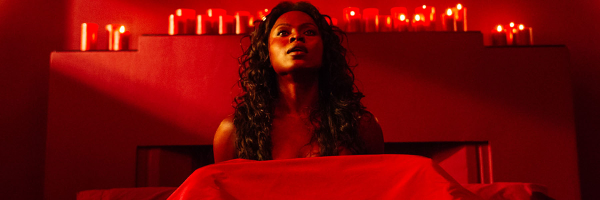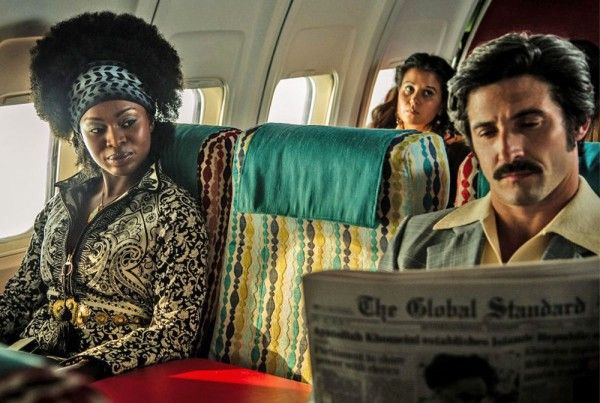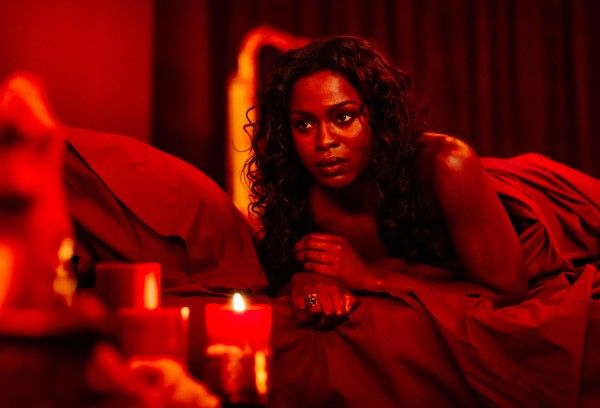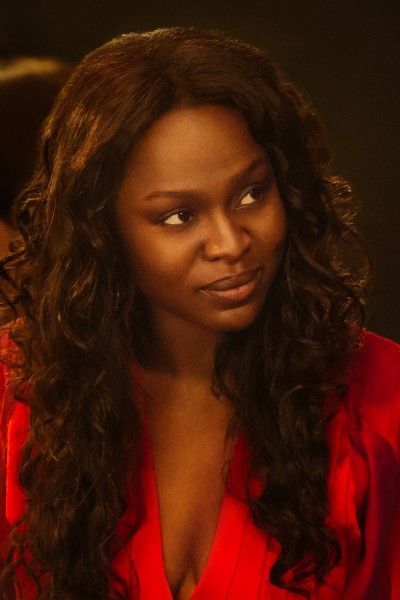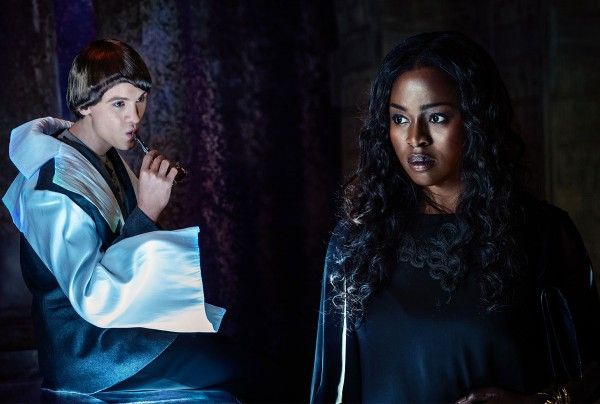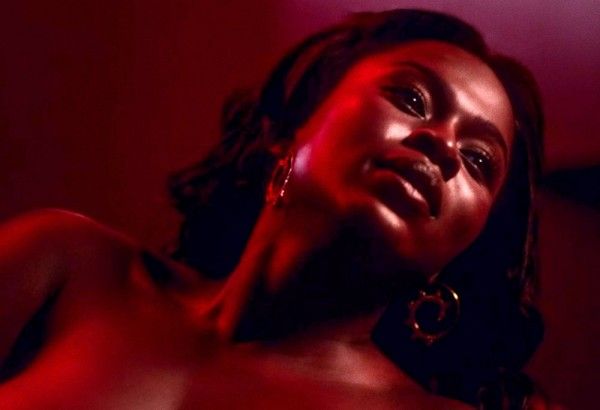From showrunners Bryan Fuller and Michael Green, and adapted from the best-selling book by Neil Gaiman, the Starz series American Gods weaves a provocative tale of faith and belief, or our lack thereof, unlike anything that’s ever been on TV before. When Shadow Moon (Ricky Whittle) is released from prison following the death of his wife (Emily Browning), he meets the mysterious Mr. Wednesday (Ian McShane), with whom he makes a deal that will change the course of his entire life. As he finds himself in the center of a world that he struggles to make sense of, a war between the Old Gods and the New Gods starts to bubble over in ways that are both horrific and mind-blowing, and that you won’t be able to take your eyes off of.
With Season 1 having just finished airing on Starz, actress Yetide Badaki got on the phone with Collider to talk about being a self-proclaimed geek, how her fears about adapting this book were immediately allayed when she read the script, taking on a role like Bilquis, getting out of her own way and finding her own inner strength and empowerment, what an ideal world looks like for the Goddess of Love, how excited she is for what’s to come in Season 2, the love fest between this cast and the creative team, and how a story like this makes you evaluate where your own worship falls. Be aware that there are some spoilers discussed.
Collider: First of all, congrats on the second season! I’m so excited that we’ll get to see more of this story and these characters.
YETIDE BADAKI: Thank you! We all have been celebrating not only the idea that we get a second season, but that we get to spend time with everyone again. It’s amazing!
This show has been magnificently beautiful and thought-provoking in such exciting ways, and your character, especially, has been a stand-out among a series of fascinating characters.
BADAKI: I’m actually looking at it going, “I’m so intrigued with every single character,” which I’ve never had before, watching a show. I’m like, “Oh, what’s happening with Mr. World? What’s going on with Media?”
What have you most enjoyed about playing this character and exploring who she is, especially over so many different time periods?
BADAKI: Right, there are all these eras. I found it really fascinating to dive into the idea of female agency through the ages, and to see what an individual may experience, having come from more ancient ties to femininity, power and creation to the present day. Bryan Fuller and Michael Green, jumping off from the incredible work of Neil Gaiman, very specifically took this character through these pivotal times for women and for agency, and for attitudes towards intimacy and sexuality. Being the big geek that I am, and loving research anyway, and being a woman and being an immigrant, and then getting to explore all of these themes, has just been beyond a dream come true.
What would you consider the biggest challenge of this role to be?
BADAKI: I would say the biggest challenge was getting over myself. A large part of it was that I self-identify as a geek and never really saw myself as that type of individual, as someone who had fully embraced all sides of herself. I, myself, had certain preconceptions about sexuality and intimacy, and growing up very conservative, there was a lot of internal battle over owning my sexuality. Yes, there are all kinds of different obstacles in jumping into such a role, but I realized that, in many ways, the largest challenges was myself. That also then led to one of the most gratifying parts of getting to play this character and fully falling in love with Bilquis. I have fallen in love with her because I think she has so much to teach myself and so much to offer. There were all these things that I was finding and discovering, along the way, that were just mind-blowing, for me, personally. So, I was the greatest challenge.
When I first read this book, I remember being so sad that I’d never get to see this book adapted because that just seemed impossible. So, when American Gods came your way, as someone who’d already read the book, what were your biggest fears or concerns about the TV adaptation?
BADAKI: As a big fan, I completely identify with that fear of, “Oh, but it’s such great work! How is it going to be translated onto the screen?” I have to say, those fears were immediately allayed once I saw the audition invitation sheet with the group that was involved, being a big fan of Bryan Fuller and being a big fan of Michael Green. And then, I saw on there that there was also “executive producer Neil Gaiman.” Beyond that, I saw the audition scene and went, “Ah, they’re gonna jump right in there!” Seeing how beautifully they had woven that, my fears were immediately allayed. You couldn’t ask for a more amazing creative team. And then, getting to go in and meet everyone, and seeing all of the different announcements of each new person that joined. The first person I really talked to on the team was Suttirat Larlarb, the costume designer, and I got to hear about all of the themes that she was weaving into these amazing costumes. And then, I met [the people behind] hair, make-up, set design and cinematography. With anything, it takes a village, and this was an incredible creative village. So, any fears I had of this amazing work not being able to be translated to screen were immediately allayed.
How did you wrap your head around playing a goddess? Did you want to just completely lean into that, or did you want to entirely put that out of your head?
BADAKI: That’s where I, myself, was my own greatest challenge. At first, you kind of want to run. However, it was so gratifying to dive into the deep, cool depths. There was layer upon layer of ancient stories of power and the creation myth, and it was so interesting. I think there was a fear of it because there was so much there. I remember that, at one of the first dinners that we had with Starz and David Slade, who directed the first three episodes, his wife and I had a quick chat in the bathroom, where all great discussions occur, and she turned to me and was like, “Girl, if you’re gonna do it, do it!” It was a simple thing that sounds like a short bit of advice, but it was everything. It was like, “If you’re gonna lean into this, lean all the way in. There’s no hedging on it.” Hedging on it would only not do service to this amazing story, to this amazing character, and to this amazing team. So, at first, I wanted to run, and then I dove in and I was so glad that I did.
This character definitely made a very much talked about impression, when she was introduced on the show. What was it like to shoot those moments, and did you have a moment where you were like, “Okay, I’m feeling empowered by this”?
BADAKI: Yes! One of the things I’m most grateful to Bilquis for is that she taught me the strength in vulnerability. I remember walking onto set, very early on for myself, and having that be my introduction to most people. There were those first couple of takes where I was hedging and not completely diving in because there was the fear part. I thought, Am I gonna do this well enough? Is this going to be okay? Even that set was a work of art. I walked in with those red walls, the huge bed, the silks and the gorgeous candles that they had to keep on changing because the continuity had to be at the same level of continuity, and that level of detail was just mind-blowing. I was sitting there with a bit of fear, and then I took a moment and took a breath and dove into what I was feeling, which was fear. And don’t we all feel fear? Don’t we all want this to work? I was feeling vulnerable, but that’s what Bilquis felt, as well. So then, I really latched onto that vulnerability and, all of a sudden, I realized what a battery vulnerability can be, once you face it and embrace it. I do remember that moment and David Slade saying, “Be fierce,” as a directorial moment, and I felt powerful. I felt like a goddess. It was one of those things where you kind of forget what happened because it feels like a full inhabitance. I remember the next day, my muscles were sore. I could feel it from the depths up, through every strand of hair. I was like, “Wow, I cannot believe I have not been embracing this, all this time!” So, yes, I felt powerful.
We saw in the final shot of the season that Bilquis is most likely off to the House on the Rock, where she will likely meet up with the other Gods. What are you most looking forward to, with Season 2? Have you had conversations about where things are headed next?
BADAKI: Well, I think people already know that I’m incredibly excited for the House on the Rock, as a fan of the book, as a fan of Neil Gaiman, and as a fan of cool and weird. House on the Rock is everything! Also, people don’t realize, or maybe they’re starting to get an idea of how much of a family this group is, but we tend to miss each other. Just the other day, there was this whole great text chain of us sending gifs to each other. I was sitting in my living room alone, just crying with laughter. These wonderful people just give me so much joy, so there’s so much excitement about getting to jump back in with everybody. Bryan has talked about how, every time we all meet up, Emily [Browning] and I ask about when Bilquis and Laura are gonna do their thing, and he’s said it could be possible. I’m very excited about that idea.
What does the Goddess of Love want? What would her perfect world look like?
BADAKI: Her perfect world would be a return to paradise, with all of that connection, intimacy, worship, sacrifice and glory. That would be the perfect world – to be remembered.
When you have a hand in telling a story like this, do you find yourself evaluating what you give your own attention to, in your life, and where your worship falls?
BADAKI: Goodness, that is one of the most wonderful things about working on a project like this ‘cause it does draw attention to all of these things. I think a lot of us don’t think about how much time we give to technology without being mindful. I wouldn’t be able to have this interview with you, if it wasn’t for technology, but that’s a mindful moment. We made a plan and said we were going to do this, and we are. That’s mindful, as opposed to surfing [on the web] for four hours. And belief is such an important thing, in general. I don’t believe I would have this role or that I would be where I am in my career, if it wasn’t for belief. I always like to point back to the fact that, at the end of 2015, I sent myself the Neil Gaiman quote, “May your coming year be filled with magic and dreams and good madness. I hope you read some fine books and kiss someone who thinks you’re wonderful, and don’t forget to make some art – write or draw or build or sing or live as only you can. And I hope, somewhere in the next year, you surprise yourself.” There was a time when I was wavering and questioning. I’d been in this town for over 10 years, and I was not feeling like I was making that much ground. I saw that quote and felt inspired because this is what I love and what I believe in, and then two months later, the audition came in. Not more than two months after that, I was on a plane to Toronto to shoot Neil Gaiman’s story. To me, it makes absolute sense that that’s the way it happened with a show like this. I think belief is so important and powerful. While I might not be able to describe the science behind it, I have found, personally, that when a lot of energy, a lot of thought, and a lot of belief and faith is put behind something, incredible things can happen.
American Gods will return to Starz for Season 2.

